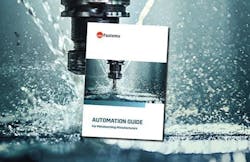Automated manufacturing solutions provider Fastems LLC has released the Ultimate Guide for Flexible Automation to examine how one optimized machine tool can perform as well as three underused machines. The guide covers the six main production bottlenecks that hinder manufacturing efficiency: production planning, production start set-up, cutting tool management, transfers and loading between process phases, quality and tracing, and machine tools.
In the average shop, machine optimization—or lack thereof—can cripple a manufacturer’s success. Unautomated machines run averagely at 30% utilization (7.2 spindle hours each day). With flexible manufacturing systems (FMS), machines can run up to 90% optimization (21.6 spindle hours a day). This change results in one automated machine running the same amount of spindle hours as three comparable unautomated machines. The automation guide and webinar explain in greater detail how manufacturers can optimize their operations. Machines in the average shop run underused for a variety of reasons. Commonly the spindle doesn’t run during setups, material and tools may not be available exactly when they need to be, scheduling inefficiency results in idle time, urgent orders wreak havoc on schedules, and machines malfunction. Further, if a shop is not set up to run lights-out, a machine can only be run for part of the manned shifts, decimating its uptime.
In the guide, Fastems reveals three keys to achieving high utilization: make production planning and execution intelligent, automate hardware to work stably night and day, and make processes reproducible.
For more information, watch the free Fastems solutions webinar at fastems.com/automation-guide.





